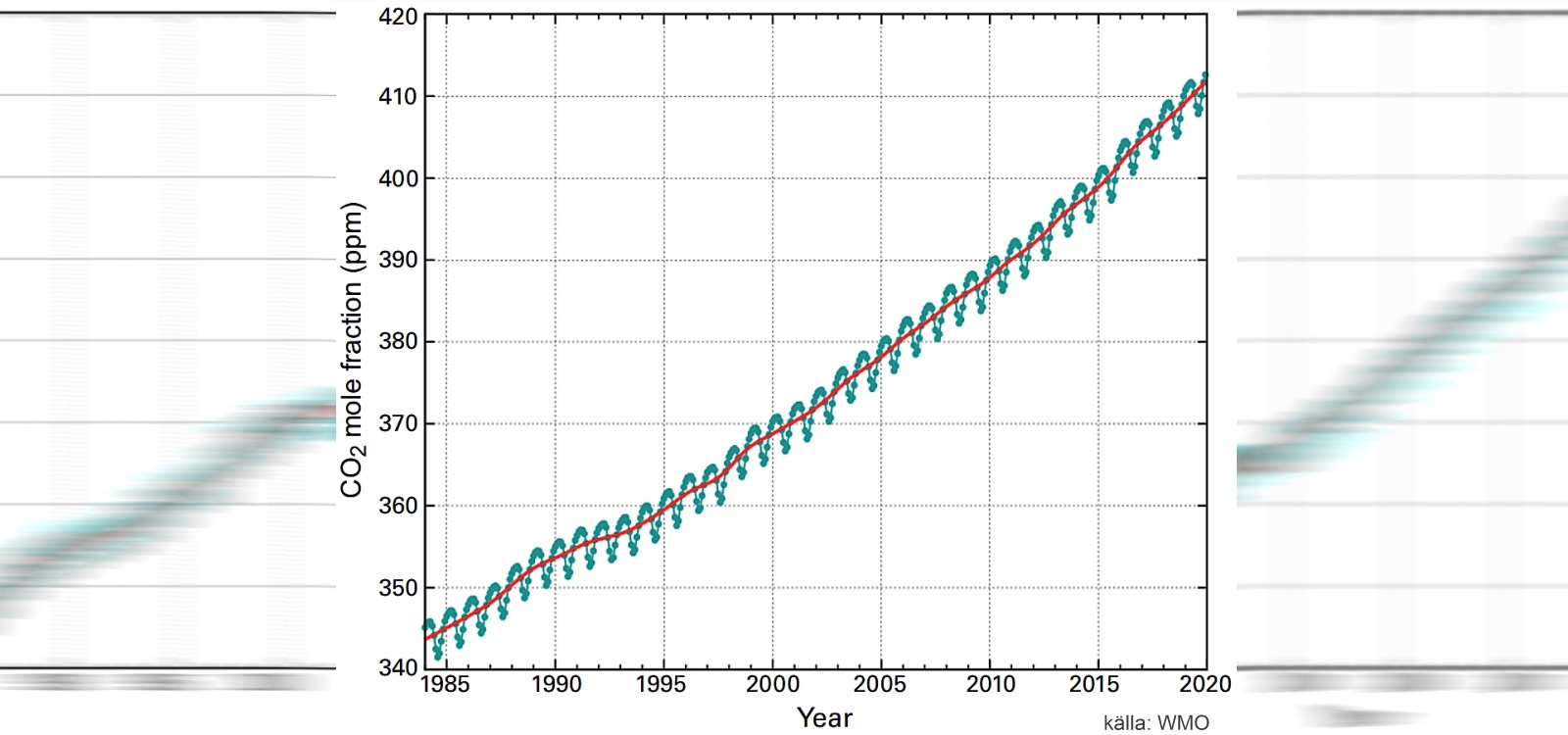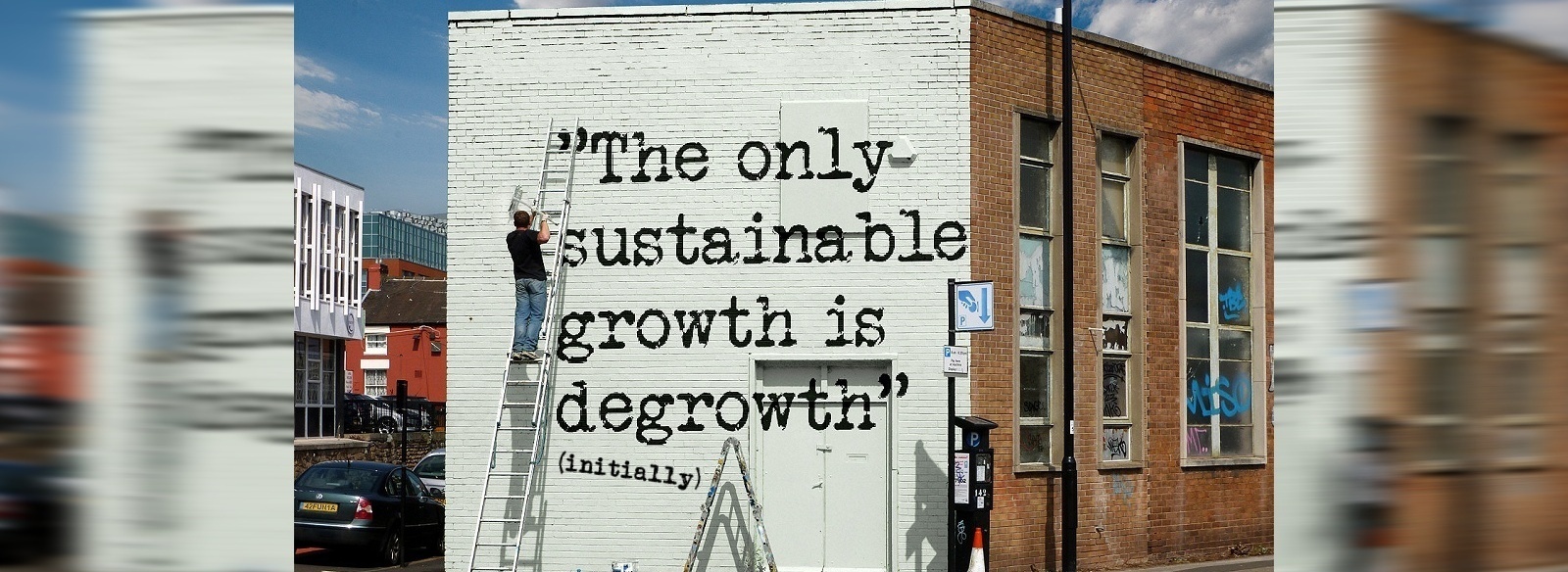Shortsightedness is one of three key concepts here at essentiell.org. We have through out this site called it
'shortsightedness' instead of the probably more gramatically correct 'short-sightedness' or 'short-term mindeset'.
Regardless, two of these,
1⁄
2 and Shortsightedness, describe characteristics of us
humans that we consider to be so destructive that we must do something about them. The negative adjective is
chosen intentionally because there is, even if it is to precede events, a risk that it actually already exists
empirical
evidence that we at least possess
qualities that are
destructive. The future may show if they really are destructive in actuality but we will try to make the case that we
may already have evidence that these traits are destructive to intelligent technological life.
In the previous section of
1⁄2 (of) Humanity
we discussed the worrying state of affairs in which we seem to have an increasing proportion of our humanity that is
cognitively different from the other half. A distinctive characteristic of the half that exhibits dissonance regarding
the perception of how our world looks is a deep-rooted need for affirmation. Not everyone in that half is of course clinical
Narcissist but they possess similar personality traits that make them clearly separate themselves and form a group around a
pattern of thought and action that we have called 'indecency'. What we mean by decency/indecency and why we use these
attributes we went through in the Definition on the START page but if a reader wants a short version, click
here
To begin to tie these two sections together, we see that while the shortsightedness of current world politics is obviously
unfortunate in many respects, it is not necessarily an indecent one. Even leaders or governments that would be considered
objectively decent can be extremely shortsighted.
Indecency, as we defined it in section
1⁄
2 (of) (Humanity), and the traits of Shortsightedness are
obviously two of the impediments of humanity and two of the distinguishing characteristics (and increasing ones)
of much of the world's current leadership. Of course, there are outstanding exceptions to shortsightedness and Narcissistic leaders.
Here is an entire site dedicated
to highlighting the most decent leaders around the world, month by month. Even the most indecent is also named...
One of the problems with short-term mindset on a personal level and for the common man, is that it is implicitly built into our
(Western) welfare. Before we go into what we mean by that in detail, it generally means that our fantastically developed welfare is
based on us being, and thus political decisions being, shortsighted.
For the reasoning we are trying to make and the way we are trying to connect the negative aspect with shortsightedness in
relation to our welfare in this section, it is important to establish an insight in a reader of what welfare means (examplified
for Swedish society but will at least to a great extent overlap with all western societies.).
To do that, we start by briefly listing some things that we expect, and in many cases demand, from our society. Then we will
tie together our point a little later.
- Healthcare
- Pension
- New roads/repairs
- Public transport ("No, I pay $100/month for it". Answer: It's actually only ≈ 1⁄3 of the real cost).
For a $100 million you get 900 meters of newly built subway
- Kindergarten - Day care("No, I pay $120/month per child for it". Answer: It's only ≈ 1⁄9
of the real cost)
- Free School 1st class to High school
- Free university studies 3-5 years (also medical school)
- Grass cutting, tree felling and maintenance of municipal/state green areas/forest land
- Roads, lampposts, traffic lights, road signs. For $100 million you get just over 30 kilometers of newly built highway.
- Parental leave
- Paid sickness leave (up to 6 months)
- Subsidized medications
- Defense
- Child care benefits ≈ $110 per month per child
- Additive child care benefits for multiple children
- Student benefits (in Sweden the state give you ≈$320/week for living expenses during the 3-5 year studies.
- Housing benefits
- Agricultural support
- Digital costs (such as online services and apps that are intended to simplify the interface between citizens and authorities, state, county or municipal institutions)
- Grants to rural municipalities so that they can, quite frankly, still exist)
- Support for separated parents in addition to Child support
- Social benefits
- Activity support to sport clubs, (so that children and young people can practice sports/activities in their free time regardless of the parent incomes.).
("No, I pay an average of $300/semester for it". Answer: It's only ≈ 1⁄4 of the real cost)
- Plowing/sanding/salting roads
- Libraries
- Installation/maintenance/burial of electrical, internet and telephone lines
- Grants for maintaining inaccessible mobile towers
- Benefit for missing salary when you're home with kids that are sick
- Research grants, for Cancer, Alzheimer, Cardiovascular diseases, Diabetes, Antibiotics for multiresistant bacterias, Vaccines etc
- Railway. For $100 million you get 25 kilometers of newly built railway
- ...and much much more
The list can in principle be made as long as the content of this entire site, but the point is that regardless of how
much we realize what we actually get for our tax money, our welfare
costs money . The cost increases roughly with a consumer
price index every year. And on top of that, we are also supposed to "increase welfare" and "expand it". That's what many
political parties are running for election on anyway. Then people have different focuses on how we expand welfare. If you
are on the left, you might prioritize a 6-hour workday, while an expanded defense and more police attract people who are
on the right.
The cost of all the components in the above relatively short list increases every year. Plus it will be expanded (
"- Because
party X promised that in the election!! ). So GDP must increase. If it does not, or
even decreases, the consequence is either that the welfare components must be reduced, or taxes raised, or money borrowed on the
financial market.
Here
is an article from Investopedia that for our younger readers goes through concepts such as GDP.
If a country, or a government, thus finds itself in a situation where welfare is at risk of being reduced, two things
happen. A reaction and an action. The
reaction is just the initial scare hiccup over a scenario where one has to start
cutting back on welfare incentives. This is frightening for any regime, since cutting welfare is in a direct
inverse
linear relationship to the chance of being re-elected.
The
action is to stimulate the economy so that the country ends up with positive GDP growth, which thereby generates a
larger treasury. National economists usually prefer a little more than 2% as some form of guideline for the GDP increase per year.
Raising taxes to increase revenue for the treasury is counterproductive as it reduces the purchasing power of the
population and would therefore instead act as a hindrance if the aim is to stimulate an economy. Paradoxically,
raising taxes is rather something that is done when GDP growth, and thus likely inflation, is too
high and one wants to
supress the inflow of money to the consumption sector.
What is often done instead is to stimulate the economy with
loans, both on the domestic and international financial markets.
The approach is to be able to repay the loans with the expected
hausse in the national economy
that is created by pumping in said
loans at well-chosen places in the various domestic consumption and financial sectors. Either directly or indirectly.
Other ways are to go via monetary policies and the Federal reserves. A lowered key interest rate from the Federal reserves stimulates banks'
lending to both companies and consumers. The loans almost by definition go to consumption for the individual and investments
for companies. Money is also pumped into national infrastructure investments that have many secondary effects in an
'investment chain' and therefore stimulate consumption at every step in that chain. Classic "Keynesianism"
- and all to
minimize the political interference in the welfare or social benefits.
It has worked for 100 years and, given those 4 years that correspond to an election period, it will work within these as well.
Short-term.
But everyone knows somewhere that the equation will not work out in the long run. What people disagree about, however,
is what "in the long run" means? You can mean that it does not work out in terms of
resources in the long run or you can talk about environmental and climate issues and industrial emissions and logistics
chains and our, the Earth's, ability for all countries to constantly aim to
increase their GDP and for everything to
grow. Will the whole system hold together for another 100 years, or even 50? Do we at least agree that in 100 years we will have
passed where either the Global Growth Machinery has broken down somewhere,
or we have had to rethink and accept reductions in our GDP balances? (or these coincide)
The question is of course multifaceted. It is both an inherent waste of resources - (new) consumption is based on
buying one thing that replaces something else (old). What is expected from those who even come close to any
form of decision-making power in these issues such as politicians, authorities, bank and Federal reserve management,
researchers, business leaders, financial institutions, etc., they expect that "it will work out". Often referring
to future technological advances, although it is unclear which ones and equally unclear
what the advances will
look like. Today, these solutions do not exist.
We agree that research is making progress. Great progress in a number of areas. But is it in the right areas and
is the progress both great enough and will all technological advances and research progress be "finished" before
it is
too late? Or maybe more explicitly expressed:
- Will the technological advances be implemented before we reach a point in time for a climatological
run-away
effect* ending in total civilizational collapse? "Too late", with regard to a future
scenario with hundreds of millions of global climate refugees due to uninhabitable areas, it already is. It already is to late for that...
*Run-away-effect, in this case refers to a climatological state where even attempts to reduce, for example,
Global Warming no longer have any effect. The climate is in a state of automatic positive auto-feedback where the
warming itself causes further warming even without any human interfering.
So, we hope that it's not too late. And while we hope, we push on, and while we push the
problems with the (unclear) future technological solutions ahead, the global average temperature is rising at an
unprecedented rate.
There are two important things to realize in the above argumentation.
1. Firstly, the reasoning bites in own tail so to speak. In order to
be able to research and make the major technological advances that "will save us", government funding for research
is required and, implicitly, a functioning scientific community. It is really only the Western world
that has that, together with China, India, Brazil and Russia. These countries are also the ones that spew out the
absolute majority of greenhouse gases in the form of CO
2 and thus have the greatest negative impact on our climate.
See
here for a compilation made by the
'Union of Concerned Scientists'.
What the section above means is: for a country to have a functioning research society at all, it needs an economic
remainder of what is left over after spending state (taxed) funds on, for example, military spending and the part it chooses
to spend on a social standard and welfare incentives. I.e, the list above. Conversely, it means that research is the first thing to cut
if the national economy starts to shrink. That is, for a regime going to election it is better to cut research funding than
on pensions/school/sickness/child benefits and the like because the latter leads to an antagonistic attitude
from the very population that vote in the election. And that does not work if you want to be
re-elected.
And even if it took time to tie together the statement that our personal characteristic of shortsightedness and political
shortsightedness are different sides of the same coin, the knot is as follows: A regime that would both want and be able to
be
long-term sustainable and
decent, is not. Because
we are not.
2. The second thing, which may be important to realize with regard to the fact that it was pointed out that there were two
important aspects to consider when it comes to research and technological progress therein, is that one must be careful
about what actually is progress and what is not. As we have said, we have a society where all decision-making and
power-exercising institutions implicitly rely on future technological progress. But somewhere along the line while we are fully aware
that when we are now driving ahead on full throttle, it is on borrowed time and implicitly thinking "it will work out".
That is why we still dare the full throttle. And that is
why we in the Western world are driving with the same growth philosophy.
For example, today such a large part of our electricity production comes from coal power and other fossil sources that
electric cars are a worse alternative than conventional petrol or diesel cars in total and globally. The biggest reason
for this is that many batteries are manufactured in China where the manufacturing logistics are so obsolete that it
reduces the entire net emission of CO
2 in particular. In the West, we have come much further and if all production were
located here, electric cars would be a better climate alternative than fossil-fuelled cars.
Here
'Forbes' has published an interesting article about this.
So of course we should not stop manufacturing and encouraging
electric-powered logistics alternatives but rather that we should aim for global fossil-free energy production.
But it
is important to have a holistic view of technological progress. Many issues, not just climate issues, tend to be seen in
far too small a context.
Another angle, which concerns the (unclear) research advances that we hope for that can help us reduce the climate
problems we now see ahead of us, concerns a phenomenon discovered as early as the end of the 19th century. This
phenomenon was recognized by the British economist William Stanley Jevons, and came to be called "Jevons' Paradox".
William Stanley Jevons discovered in the end of the 19th century that technological advances whose purpose was to
increase the efficiency of coal use, that is, that less coal would be required for the same energy output, rather
led to an
increased consumption of coal. This phenomenon has since been confirmed in much later studies, read more
here.
The paradox is close to what we mentioned about the fact that we often lack a holistic view of a problem. In general,
Jevons' paradox means that through technological efficiency improvements in the use of a resource or the production of a resource, we
rather induce an
increase in its use rather than
reducing it due to "technological efficiency improvements".
That is, the environmental considerations today of reducing resource waste,
which are certainly benevolently considered for a better climate, overlook or simply leave out the purely commercial
incentives in this process. Efficiency by definition leads to an opportunity to increase the production rate and
quantity of a final product, with the same amount of original resource or amount of energy consumption.
We do not want this to be interpreted as us opposing capitalist incentives
per-se. Quite the contrary, those
incentives will be needed because it is obviously an unparalleled motivator for us humans to implement a production
chain from resource to customer quickly and efficiently. What we mean, however, is that that process must take place
with a detailed political control that guarantees a long-term mindset and sustainability.
To tie together the argument about shortsightedness we are
all shortsighted. Both as people and because we simply do not
possess a gene for a "long-term mindset" but also as regimes and then for a single reason: They want to be re-elected. But the
chronology of the above, i.e. what is the chicken and the egg, can be important for a decent regime to consider. The
regime is shortsighted because we are and because we refuse to agree to the smallest interference in our welfare and social benefits.
Then there are obviously different degrees of indecency that a regime carries in order to be re-elected. You can be
basically decent and try to minimize the unsustainable components in society, but only minimize them. The goal is still
to get re-elected. Then you can be completely indecent and completely ignore the sustainability agenda in order to get
re-elected. Both are short-term, however.
We must realize that in principle all of the points in the list above that are included in what we call welfare are at risk of being
reduced in some way, and we have not realized or accepted that yet. Here too, there are degrees of indecentness behind the personal
inability to accept this:
- We may be fundamentally decent, but we also believe in future technological advances. Even if it is as unclear
(what advances) to us as it is to the decision-makers.
- Or we don't think it's as urgent as it is – we're simply not informed.
- Or you are being completely indecent and completely ignoring the sustainability agenda.
As soon as you hear complaints about our welfare and that it should be expanded and increased, you know that this person has not
grasped in any sense that we are on the brink of a climate disaster. We have already passed "too late", as we have said, now
we are only talking about the
degree of disaster.
"- But the scientists are still arguing about how serious it is!"
No, the scientists are not arguing at all, it is the politicians who are arguing. About what should or should not be done.
The
scientists stand up and are essentially screaming that we have already passed the border to climate disaster.
It is now only the degree
of it that we can still regulate. Read more
here and
here.
"- But it will be solved, technology and capitalism have always solved our problems so far!" When? How?...What?
Shortsightedness is and remains a problem, and a big one
Introducing a sustainability perspective, purely from an economic perspective, is very likely to be seen as deeply naive by
politicians, (national) economists, ministers of finace, companies and similar financial and economical institutions and decision-makers,
and it is likely that the argumentation goes largely along the following lines:
"We cannot introduce such far-reaching laws and regulations to stop climate problems, then we would have to dismantle
such large parts of the public benefits and social welfare we are used to that no one would accept it. It is impossible
and the "wooke people" standing on the barricades shouting for action have no idea what the consequences would be
on a national basis. It is just deeply naive and unrealistic!"






